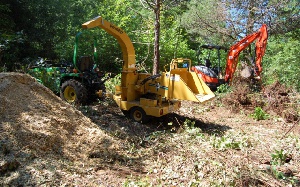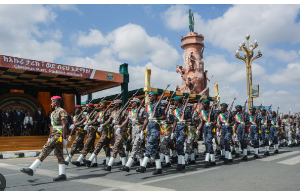Hundreds of residents in Wassa Juabo in the Amenfi Central Municipality of the Western Region on Thursday, 20 October went on a demonstration against Chinese miners who have taken over large hectares of forest reserves in the area and excavating it for gold.
Convener of the demonstration, Mr Kwabena Manu, told Chief Jerry Forson on Accra100.5FM’s breakfast show Ghana Yensom that as many as 72 excavators have been deployed to the forest to mine gold.
He claims the forest was given to the Chinese by President John Mahama and his government. According to him, the Regional Minister, Municipal Chief Executive, the regional chairman of the governing National Democratic Congress (NDC) and other government officials in the area are tacitly supporting the Chinese to mine gold in the forest reserve.
The angry resident have, therefore, threatened to vote against President Mahama and the NDC in the 7 December polls if they do not stop the Chinese, who have been there for the past two months, from continuing with their illegal mining activities in the forest reserve.
The demonstration in Wassa Juabo came just a day after about 500 angry illegal miners in the Obuasi East Municipality in the Ashanti Region also went on a demonstration and vandalised offices of the NDC and the main opposition New Patriotic Party (NPP) to demand that they be allowed to continue with their illegal mining activities in a concession of AngloGold Ashanti.
Meanwhile, security analyst Dr Kwesi Aning has warned that galamseyers in the country will “fight to the death” to “protect their livelihood,” and, therefore, urged state security agencies to think through whatever response and strategies they fashion out to deal with the recent uprising by some illegal miners at Obuasi in the Ashanti Region.
“There are enough guns in the hands of galamseyers and they are desperate enough to want to fight to protect what they perceive to be their livelihood, and, therefore, whatever response (robust or otherwise) that the state of Ghana wants to put up must be carefully thought out because the galamseyers are prepared to fight to the death,” Dr Aning told Prince Minkah on Class91.3FM’s Executive Breakfast Show on Thursday, 20 October.
The irate galamseyers, amidst chants of “no galamsey, no vote” destroyed windows, TV decoders, billboards, plastic chairs and other properties they could lay hands on.
The Municipal Chief Executive, Richard Ofori Boadi Agyemang, confirmed the vandalism and said additional security measures were being taken to forestall further destruction.
He explained that the youth were angry over a recent quit order given to them by the Minerals Commission in connection with their activities in the AngloGold Ashanti concession in the area.
The miners were to vacate the concession immediately or be forced out by Monday, 10 October, 2016.
The Commission, in collaboration with the Movement Committee, fashioned out modalities to relocate the illegal small-scale miners from AGA’s concession.
At a ceremony to present the Committee’s report, the CEO of the Minerals Commission, Dr Tony Aubyn, said: “As you are well aware, both the Government of Ghana and AGA are signatories to the voluntary principles of human rights. In order to avoid unnecessary violent confrontation and possible loss of life, government opted to negotiate the exit of these unauthorised operators on the mine.
“Following a series of meetings by the Minerals Commission and other government officials, with the informal operators, a decision was made to set up a committee to oversee the relocation of the informal miners from AGA’s concession to the surrounded areas.
“The informal miners were to be relocated and formalised on mineralised areas that form part of the surrounded 60 per cent of the original concession area. The committee, which was called the Movement Committee, was, therefore, inaugurated on August 2, 2016, with the mandate to oversee the peaceful exit of the informal miners within one month, which ended on September 2, 2016.
“The committee requested and was granted additional two weeks to complete its work. In drafting the membership of the Movement Committee, the Minerals Commission considered the inclusion of various major stakeholders and relevant institutions to ensure that all aspects of the relocation processes were duly covered during execution of the plan. The committee’s membership was as follows: Minerals Commission, Adansi Traditional Council, Obuasi Small Scale Miners Association, Ghana National Small Scale Miners Association, Obuasi Municipal Assembly, and the Ghana Police Service.”
AGA recently gave up a 273-sq.km concession this year, which represents about 60 per cent of its land size of 485-sq.km. The move followed violent disturbances at the concession.
In May this year, AGA said despite repeated attempts to have Ghanaian authorities restore law and order at the Obuasi mine, the security situation on site continued to deteriorate.
To protect and enforce its contractual rights in the face of increasing lawlessness, trespassing, damage to property and threats to the safety of its employees, the miner said it had been forced to invoke the dispute resolution provisions in its Mining Lease.
Accordingly, AGA filed a Request for Arbitration with the International Centre for Settlement of Investment Disputes (ICSID) on Friday, 8 April, 2016.
The case was registered on Monday, 2 May, 2016. ICSID is an international arbitration institution headquartered in Washington, D.C., which facilitates dispute resolution between international investors and host states.
The relevant authorities in Ghana, including the Attorney General, were duly notified of the commencement of proceedings.
In early February 2016, following the incursion of hundreds of illegal miners inside the fenced area of the site, AGA was forced to declare force majeure and, in the interests of safety, withdrew all employees performing non-essential functions from the Obuasi mine.
Remaining employees have been performing critical services related to the operation of underground water pumping, environmental and potable water treatment, provision of medical services, and maintenance of facilities that provide power and water to employees’ homes and surrounding communities.
There has been no impact on AngloGold Ashanti’s production and All-In Sustaining Costs as the site was not forecast to be in production for at least this year.
The incursion by illegal miners followed the withdrawal of military protection from the mine on Tuesday, 2 February 2016, after initial incursions on 30 and 31 January 2016.
The military had been stationed at the mine since 2013 on directions from the Ghanaian government in order to maintain law and order at the site. To this effect, a services agreement is in place between AngloGold Ashanti Ghana and the Ghana Army. Additionally, the Chamber of Mines, on behalf of its members, has entered into a Memorandum of Understanding with the Ghana Army, to support mine security and police through the deployment of military personnel at mining operations in the country.
Since February 2016, AngloGold Ashanti Ghana said it has engaged on numerous occasions with Ghana Cabinet ministers including the Minister of Lands and Natural Resources, the Minister of Defence, and other senior government officials over the matter.
AngloGold said despite these engagements, and the fact that Ghana’s President Mr John Mahama directed the return of security agencies in March, law and order had still not being restored at the concession.
In its declaration of force majeure, AngloGold Ashanti Ghana explained that the current situation was precluding it from fulfilling certain conditions of its Amended Programme of Mining Operations, which was agreed with the government in November 2014. In particular, the presence of illegal miners on the mine’s operational footprint, in its underground tunnels and in areas which host key infrastructure at the mine was impacting directly on AGA’s “ability to continue to perform even the most essential services referred to above, including the treatment of water for pollutants.”
“If allowed to continue unchecked, this occupation of the lease area by illegal miners significantly undermines investor confidence and gravely threatens the long-term viability of the mine, as AngloGold Ashanti Ghana may be forced to withdraw all essential personnel currently on site, including personnel operating the mine’s underground water pumps, and suspend critical services to the mine and community,” it said in May.
AngloGold Ashanti Ghana said it hoped that the commencement of ICSID proceedings will expedite the reinstatement of law and order at the mine.
Background
AngloGold Ashanti Ghana suspended underground mining operations at the Obuasi Mine at the end of 2014 after incurring heavy (and ultimately unaffordable) financial losses over several years.
Employees were paid a severance as mandated by law and in accordance with relevant Collective Agreements and Employment Contracts.
So far, about 100 people have died as a result of illegal mining activities in the area. About 3,000 small-scale miners operate in the area.
Business News of Thursday, 20 October 2016
Source: classfmonline.com













